I'm coming back to programming after having done none for several years, and created a Sudoku game to get my feet wet again. I've written a recursive function to brute-force a solution, and it will do so for simple board states, but runs into a stack overflow most of the time for more complicated board states. I know that this could be averted using loops or a more efficient algorithm, but since this is for the sake of learning I want to know how to allocate more memory to the stack (acknowledging this isn't the best solution to the problem).
An answer here: How to change stack size for a .NET program? that recommends using a thread with more memory allocated isn't working, as from what I can read .NET 4.0 will not let you increase a thread's maximum allocated memory beyond the default.
Another solution recommends using EDITBIN.EXE, but I am new to Visual Studio and have not found an explanation I understand of how to do so.
Similarly, I've found that you can use a .def file to indicate a larger default stack size, but have not found an explanation I understand of how to create/implement one.
Can anyone offer newbie-level explanations of either EDITBIN.EXE or .def file implementations, or offer another way to increase the stack size?
using System;
using System.Collections.Generic;
using System.Linq;
using System.Text;
using System.Threading.Tasks;
using System.IO;
namespace Sudoku
{
//object keeps track of the value of all numbers currently on the board using an array
class BoardState
{
int testcount = 1;
//3d array of ints representing all values on the board, represted as region, column, row
int[,,] boardVals;
//3d array of bools representing if a number is immutable (true cannot be changed, false can be)
bool[,,] fixedVals;
//create a blank board if no initial values are provided
public BoardState()
{
boardVals = new int[9, 3, 3];
fixedVals = new bool[9, 3, 3];
}
//create a board with the listed initial values as immutable
public BoardState(int[,,] inputVals)
{
boardVals = inputVals;
fixedVals = new bool[9,3,3];
for (int i = 0; i < 9; ++i)
for (int j = 0; j < 3; ++j)
for (int k = 0; k < 3; ++k)
if (boardVals[i, j, k] > 0) fixedVals[i, j, k] = true;
}
//update the state of the board using the coordinates of a single value
//**note** method has not been implemented and tested yet
public void updateState(int region, int column, int row, int val)
{
if (!fixedVals[region, column, row])
{
boardVals[region, column, row] = val;
}
}
//update the state of the board to match the state of another board
public void updateState(int[,,] newState)
{
boardVals = newState;
}
public int[,,] getVals()
{
return boardVals;
}
public bool[,,] getFixed()
{
return fixedVals;
}
//set all non-zero values to be immutable
public void setFixed()
{
for (int i = 0; i < 9; i++)
for (int j = 0; j < 3; j++)
for (int k = 0; k < 3; k++) {
if (boardVals[i, j, k] != 0)
fixedVals[i, j, k] = true;
else
fixedVals[i, j, k] = false;
}
}
//test method
public void testState()
{
for (int i = 0; i < 9; i++)
for (int j = 0; j < 3; j++)
for (int k = 0; k < 3; k++)
Console.WriteLine(boardVals[i, k, j]);
}
//accepts a 3d array representing the current board state.
//returns a 3d bool array denoting whether any region, row, or column is invalid (true=invalid)
//first value of array designates the region, row, or column respectively
//second value designates which of those is invalid
public bool[,] validateBoard()
{
bool[,] valid = new bool[3, 9];
int[,] rows = makeRows(boardVals);
int[,] cols = makeCols(boardVals);
//compare each value in each row to each other value in that row
for (int i = 0; i < 9; i++)
{
for (int j = 0; j < 9; j++)
{
//only validate an entry if it has been assigned a value
if (rows[i, j] != 0)
{
for (int k = 0; k < 9; k++)
{
//if two values are not the same entry and are equal, set that entry to invalid
if (j != k && rows[i, j] == rows[i, k])
valid[1, i] = true;
}
}
}
}
//compare each value in each column to each other value in that column
for (int i = 0; i < 9; i++)
{
for (int j = 0; j < 9; j++)
{
//only validate an entry if it has been assigned a value
if (cols[i, j] != 0)
{
for (int k = 0; k < 9; k++)
{
//if two values are not the same entry and are equal, set that entry to invalid
if (j != k && cols[i, j] == cols[i, k])
valid[2, i] = true;
}
}
}
}
//compare each value in each region to each other value in that region
for (int i = 0; i < 9; i++)
{
for (int j = 0; j < 3; j++)
{
for (int k = 0; k < 3; k++)
{
//only validate an entry if it has been assigned a value
if (boardVals[i, j, k] != 0)
{
for (int l = 0; l < 3; l++)
{
for (int m = 0; m < 3; m++)
{
//if two values are not the same entry and are equal, set that entry to invalid
if (!(l == j && m == k) && boardVals[i, j, k] == boardVals[i, l, m])
valid[0, i] = true;
}
}
}
}
}
}
return valid;
}
public bool isValid()
{
bool retFlag = true;
bool[,] valid = new bool[3, 9];
int[,] rows = makeRows(boardVals);
int[,] cols = makeCols(boardVals);
//for (int i = 0; i < 9; i++)
// for (int j = 0; j < 3; j++)
// for (int k = 0; k < 3; k++)
// Console.Write(boardVals[i, j, k]);
//compare each value in each row to each other value in that row
for (int i = 0; i < 9; i++)
{
for (int j = 0; j < 9; j++)
{
//only validate an entry if it has been assigned a value
if (rows[i, j] != 0)
{
for (int k = 0; k < 9; k++)
{
//if two values are not the same entry and are equal, set that entry to invalid
if (j != k && rows[i, j] == rows[i, k])
{
retFlag = false;
}
}
}
}
}
//compare each value in each column to each other value in that column
for (int i = 0; i < 9; i++)
{
for (int j = 0; j < 9; j++)
{
//only validate an entry if it has been assigned a value
if (cols[i, j] != 0)
{
for (int k = 0; k < 9; k++)
{
//if two values are not the same entry and are equal, set that entry to invalid
if (j != k && cols[i, j] == cols[i, k])
{
retFlag = false;
}
}
}
}
}
//compare each value in each region to each other value in that region
for (int i = 0; i < 9; i++)
{
for (int j = 0; j < 3; j++)
{
for (int k = 0; k < 3; k++)
{
//only validate an entry if it has been assigned a value
if (boardVals[i, j, k] != 0)
{
for (int l = 0; l < 3; l++)
{
for (int m = 0; m < 3; m++)
{
//if two values are not the same entry and are equal, set that entry to invalid
if (!(l == j && m == k) && boardVals[i, j, k] == boardVals[i, l, m])
{
retFlag = false;
}
}
}
}
}
}
}
return retFlag;
}
//returns an array of all the values in each row
public int[,] makeRows(int[,,] boardState)
{
int[,] rows = new int[9, 9];
for (int i = 0; i < 9; i++)
for (int j = 0; j < 9; j++)
rows[i, j] = boardState[j / 3 + ((i / 3) * 3), j % 3, i - ((i / 3) * 3)];
return rows;
}
//returns an array of all values in each column
public int[,] makeCols(int[,,] boardState)
{
int[,] cols = new int[9, 9];
for (int i = 0; i < 9; i++)
for (int j = 0; j < 9; j++)
cols[i, j] = boardState[((j / 3) * 3) + (i / 3), i - ((i / 3) * 3), j % 3];
return cols;
}
//update the board state to a state read in from a file
public void updateFromFile(Stream update)
{
int[,,] newVals = new int[9, 3, 3];
int[,,] newFixed = new int[9, 3, 3];
StreamReader file = new StreamReader(update);
for (int i = 0; i < 9; i++){
for (int j = 0; j < 3; j++){
for (int k = 0; k < 3; k++){
boardVals[i, j, k] = (int)char.GetNumericValue((char)file.Read());
}
}
}
for (int i = 0; i < 9; i++){
for (int j = 0; j < 3; j++){
for (int k = 0; k < 3; k++){
fixedVals[i, j, k] = (0 != ((int)char.GetNumericValue((char)file.Read())));
}
}
}
file.Close();
}
public void Solve(int entry, int val)
{
Console.WriteLine("This is call number " + ++testcount);
//returns if all values are filled and valid
if (entry == 81)
{
Console.WriteLine("Solved!");
return;
}
//creating reference coordinates based on entry value
int reg = entry / 9;
int col = (entry - (reg * 9)) % 3;
int row = (entry - (reg * 9)) / 3;
//if current entry being checked is a fixed value, go the next value
if (!fixedVals[reg, row, col])
{
Console.WriteLine("");
Console.WriteLine("Making an attempt at entry " + entry + " using value " + val);
Console.WriteLine("This entry is at region " + reg + ", col " + col + ", row " + row);
//assign entry the value to be tested
boardVals[reg, row, col] = val;
//if the value is valid, go to the next entry
if (isValid())
{
Console.WriteLine("Entry Valid at " + entry);
val = 1;
entry++;
Console.WriteLine("Trying the next entry at " + entry);
Solve(entry, val);
}
//if the value is invlid and all 9 values have not been tried,
//increment value and call again at same entry
if (!isValid() && val < 9)
{
Console.WriteLine("Entry Invalid at " + entry + " with value " + val);
++val;
Console.WriteLine("Trying again with value " + val);
Solve(entry, val);
}
//if the value in invalid and all 9 values have been tried,
//zero out the entry and go back to the previous non-fixed entry
if (!isValid() && val == 9)
{
do
{
boardVals[reg, row, col] = 0;
Console.WriteLine("Reached Value 9 and was still invalid");
--entry;
Console.WriteLine("Trying again at entry " + entry);
Console.WriteLine("The value at that entry is " + boardVals[reg, row, col]);
reg = entry / 9;
col = (entry - reg * 9) % 3;
row = (entry - reg * 9) / 3;
if (fixedVals[reg, row, col])
Console.WriteLine("But that's a fixed value, so I'll go back one more");
Console.WriteLine("");
} while (boardVals[reg, row, col] == 9 || fixedVals[reg, row, col]);
val = boardVals[reg, row, col] + 1;
Solve(entry, val);
}
}
else Solve(++entry, val);
}
}
}

